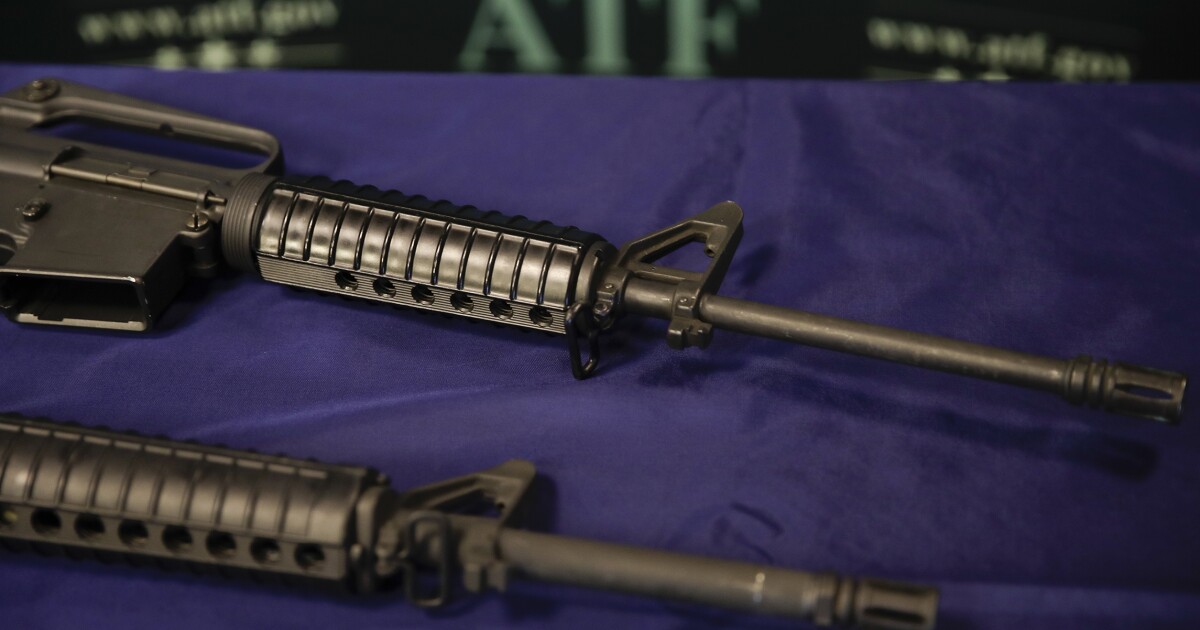

The Illinois Supreme Court ruled that the state’s “assault weapons” ban is constitutional, delivering a blow to Republican lawmakers and gun rights advocates who alleged it violated the Second Amendment.
The Protect Illinois Communities Act bans the sale of dozens of specific types of rifles and handguns, such as AR-15 rifles and .50-caliber guns, attachments, and rapid-firing devices. The court affirmed the act’s constitutionality on Friday.
HAWAII FIRE: FIREFIGHTERS DROP 150,000 GALLONS OF WATER AS FIRE DEVASTATES ISLANDS
Illinois Republican lawmakers, led by state Rep. Dan Caulkins, and gun owners had filed a complaint that the semiautomatic ban is a clear violation of the right to possess guns and also violates the Constitution’s right to equal protection under the law and a state constitutional provision banning “special legislation” when a “general law is applicable.”
Four of the state high court’s Democratic justices — Justices Elizabeth Rochford, Joy Cunningham, and P. Scott Neville and Chief Justice Mary Jane Theis — ruled in favor of the state. Republican Justices Lisa Holder White and David Overstreet dissented, and Democratic Justice Mary Kay O’Brien wrote a separate dissent.
Rochford wrote in the majority opinion that the plaintiffs attempted to “piggyback a second amendment claim” onto the equal protection allegations, which are subjected to different types of analysis.
She said the plaintiffs waived any Second Amendment challenge to the restrictions in its appeal.
“The theory under which a case is tried in the circuit court cannot be changed on review, and an issue not presented to or considered by the circuit court cannot be raised for the first time on review,” Rochford said. “Allowing a party to change his theory of the case on review would weaken the adversarial process and the system of appellate jurisdiction and could also prejudice the opposing party, who did not have an opportunity to respond to that theory in the circuit court.”
Rochford added that whether the law restricted the right to bear arms depended on whether the “bearable arms are commonly used for self-defense and whether the regulations are consistent with this nation’s historical traditions.”
“Unsurprisingly, the record contains no evidence — beyond news articles — relevant to these questions because plaintiffs never raised them in the circuit court,” Rochford wrote. “Even if the complaint alleged a second amendment claim, the record does not support affirming the judgment on that basis.”
Jerry Stocks, attorney for the plaintiffs, argued the law is not being applied equally, as “grandfathered” gun owners may keep now-restricted guns, but no one else can purchase them.
However, Rochford argued that under the act, plaintiffs can retain the restricted items they have but not purchase any more. If they do not own any of the restricted items, she wrote, they cannot claim equal protection violations because it does not apply to them.
The ruling allows the state to fend off its first major challenge to the “assault weapon” ban. The law is awaiting its fate in a federal appellate court. The Supreme Court announced in July that it would allow Illinois’s ban to remain in place while appellate arguments are heard.
CLICK HERE TO READ MORE FROM THE WASHINGTON EXAMINER
Gov. J.B. Pritzker (D-IL) released a statement on Friday, saying he was “pleased” with the high court’s ruling.
“This is commonsense gun reform law to keep mass-killing machines off of our streets and out of our schools, malls, parks, and places of worship,” Pritzker said. “Illinoisans deserve to feel safe in every corner of our state — whether they are attending a Fourth of July Parade or heading to work — and that’s precisely what the Protect Illinois Communities Act accomplishes.”




